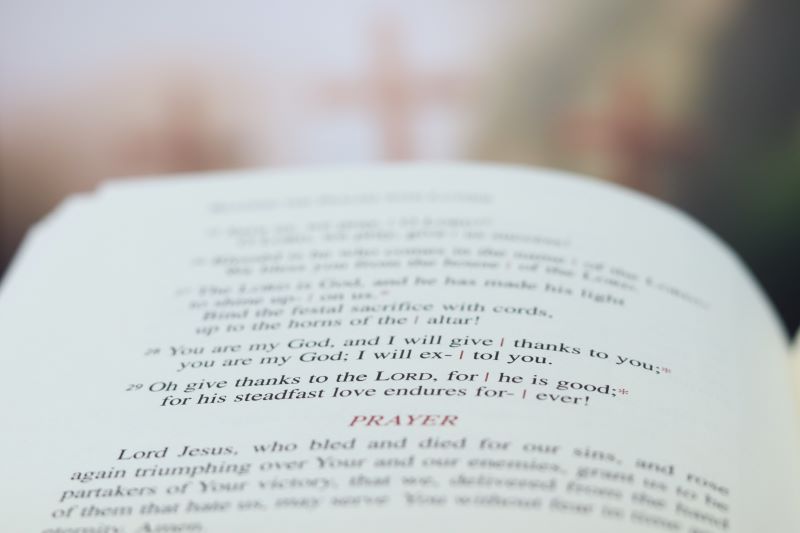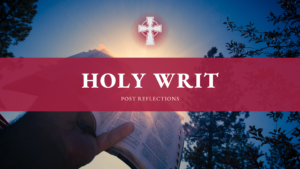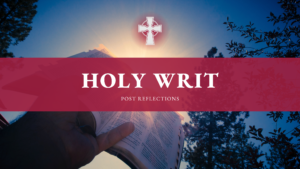
MONDAY AFTER THE FIRST SUNDAY IN LENT
If you are new to liturgical prayer – structured organized prayer – the Daily Office might be challenging for you. A feeling of inauthenticity may creep into your mind when reading a scripted prayer written by another or reciting passages to God while praying. God’s Word warns us we must come before His throne with humble and contrite hearts. Scripture again warns us to be aware of the leaven of the Pharisees, Herodians, and the Sadducees, as well as other such vain traditions. And we’re even given a clear prohibition by Christ not to pray “like the hypocrites” (Matt. 6:5). If this is the case, how does one avoid the error of making scripted prayer an outward vanity, even reducing it to a chore, but instead an inward mark of true piety and a sweet-smelling aroma to the Lord?
God Sets a Pattern for Devotion
“And God said, “Let there be lights in the expanse of the heavens to separate the day from the night. And let them be for signs and for seasons, and for days and years…”
God, in His infinite wisdom, set the luminaries as signs and for seasons. He appointed times for us to eat and drink, to play, and to work. He even set time for us to enjoy Him. Have you ever asked why God is walking in the cool of the day in the Garden of Eden? Why after the fall of humanity is the coolness of the day even mentioned?
We read:
“And they heard the sound of the LORD God walking in the garden in the cool of the day, and the man and his wife hid themselves from the presence of the LORD God among the trees of the garden.”
We fell from our relationship with God and Creation when we grasped to be like Him, but God, in His mercy, reminds us of these perpetual signs and seasons for the purposes of appointed times of sacrifice, devotion, and prayer. The Lord God sets these three daily sacrifices to the sons of Aaron, according to the Law of Moses:
- Guilt/Sin/Trespass offering: “This is the law of the guilt offering”
- Ascension (burnt) offering: “This is the law of the burnt offering.” Leviticus 6:9 (ESV)
- Peace offering: “And this is the law of the sacrifice of peace offerings that one may offer to the LORD.” Leviticus 7:11 (ESV)
These sacrifices of guilt, ascension, and peace were offered in the morning, afternoon, and evening as appointed times. To see this in Scripture, Daniel in exile prays toward the temple at these times when these sacrifices are being offered so that his prayers are heard (2 Chron 6:20; Dan 6:10). When were these sacrifices offered in the morning, afternoon, and in the evening? When would have Daniel set a time to pray towards the temple? According to Jewish Tradition: (1) in the third hour: the first lamb is sacrificed (Edersheim, The Temple, Ch 7, p. 108), (2) in the sixth hour, the second lamb is prepared, and lastly, (3) the ninth hour, the second lamb is offered as a sacrifice.
“They offer to the LORD every morning and every evening burnt offerings and incense of sweet spices, set out the showbread on the table of pure gold, and care for the golden lampstand that its lamps may burn every evening” (2 Chronicles 13:11).
These appointed times found in the creation and temple are fulfilled in the person and work of Christ, whose blood propitiated a sin offering for us, whose ascension offering brings us to heavenly throne to the Father as an acceptable grain offering, and is our peace offering through His intercession between God and man:
Mark 15:25: “And it was the third hour when they crucified him.”
Mark 15:33: “And when the sixth hour had come, there was darkness over the whole land until the ninth hour.”
As His Body, the living stones of the temple, we pray:
“Let us pray. Blessed Savior, at this hour you hung upon the Cross, stretching out your loving arms: Grant that all the peoples of the earth may look to you and be saved; for your tender mercies’ sake. Amen” (Daily Office).
God appointed these times for animal sacrifice through the intercession of angels in hope of a greater sacrifice and redeemer. Now that the Redeemer has come and dwelt among men to make the once for all sacrifice, Christians bear their cross as living sacrifices in these moments of intentional devotion.
Acts 2:15 For these people are not drunk, as you suppose, since it is only the third hour of the day.
Acts 3:1 Now Peter and John were going up to the temple at the hour of prayer, the ninth hour.
Acts 10:9–10 The next day, as they were on their journey and approaching the city, Peter went up on the housetop about the sixth hour to pray.
God Teaches Us How to Pray
“… And when you pray, do not heap up empty phrases as the Gentiles do, for they think that they will be heard for their many words. Do not be like them, for your Father knows what you need before you ask him. Pray then like this: ‘Our Father in heaven, hallowed be your name. Your kingdom come, your will be done, on earth as it is in heaven. Give us this day our daily bread, and forgive us our debts, as we also have forgiven our debtors. And lead us not into temptation but deliver us from evil.’”
What does it mean to not heap up empty phrases? This isn’t a rebuke for using frequently repeated phrases in prayer, and a quick review of Psalm 136 would clearly prove that Jesus isn’t implying this. He tells us in the Lord’s Prayer that we are to pray this day for our daily bread. It means we must come to God, daily praying:
- An acknowledgment of who God is
- A petition for God and His Kingdom
- Our daily and continual sustenance
- Forgiveness of our sins
- Favor and strength against evil
Jesus hearkens back to Old Testament patterns in his prescription for prayer. For an example of this, the Psalms are full of themes of kingdom (Ps 2, Ps 110), of daily provisions (Ps 23), repentance (Ps 51), and struggling through evil (Ps 88, Ps 91).
His apostles and disciples in the New Testament affirm each element of the same prayer structure as prescribed. Here are a few examples:
Our Father in Heaven, hallowed be your name. Your kingdom come, your will be done earth as it is in heaven:
“First, I thank my God through Jesus Christ for all of you, because your faith is being reported all over the world. God, whom I serve with my whole heart in preaching the gospel of his Son, is my witness how constantly I remember you in my prayers at all times; and I pray that now at last by God’s will the way may be opened for me to come to you” (Rom. 1:8–10).
Give us this day our daily bread:
“Do not be anxious about anything, but in everything, by prayer and petition, with thanksgiving, present your requests to God. And the peace of God, which transcends all understanding, will guard your hearts and your minds in Christ Jesus” (Phil. 4:6–7).
And forgive us our debts, as we also have forgiven our debtors. And lead us not into temptation but deliver us from evil.:
“And so, from the day we heard, we have not ceased to pray for you, asking that you may be filled with the knowledge of his will in all spiritual wisdom and understanding, so as to walk in a manner worthy of the Lord, fully pleasing to him: bearing fruit in every good work and increasing in the knowledge of God; being strengthened with all power, according to his glorious might, for all endurance and patience with joy; giving thanks to the Father, who has qualified you to share in the inheritance of the saints in light. He has delivered us from the domain of darkness and transferred us to the kingdom of his beloved Son, in whom we have redemption, the forgiveness of sins. ” (Colossians 1:9–14)
It is clear looking through both Old and New Covenants through the lens of the Lord’s Prayer, following an organized structure is the way our Lord tells us how to pray.
God Helps Us Pray
When God freed the children of Israel, He did not do so immediately. In fact, He very rarely does. Rather, He walked with them in the fire and the smoke, He fed them and walked with them for forty years. After Christ our redeemer brought us through the spiritual exodus out of sin and death, He bestowed His Helper – the Holy Spirit – to aid us in overcoming the evil one. Like the type and shadow that was the exodus of Egypt, God walks with us and doesn’t forego the process of our wandering in the wilderness. He will supply the strength we need to make it to the promised land by the power of prayer, so petition His grace, even when you aren’t feeling like praying.
Walk with the Holy Spirit and He will supply you the grace needed to pray “without ceasing” and offer your time as a living sacrifice to the duty of your priestly office.
Continue to pray as He promises to help us in our weakness:
“For we do not know what to pray for as we ought, but the Spirit himself intercedes for us with groanings too deep for words… the Spirit intercedes for the saints according to the will of God” (Rom. 8:26 ESV).
The Sweet, Sweet Fruit of Perseverance
If you are troubled with structured prayers and devotions keep this in mind: God calls us to pray daily and He has set appointed times as an illustration of His redemptive story.
He has called us in sanctification to walk by the Spirit in our prayers. A list of to-dos may at first be awkward or feel unnatural. But what may begin as a chore in the flesh will eventually be solidified as spiritual discipline into a disciple.
Discipline becomes habit, and finally, a habit becomes a love.
Related Resources
A Call to Constant Prayer from St. Anthony– J. Bartolo Cruz
A Course on Biblical Worship– James B. Jordan
Temple– Its Ministry and Service – Alfred Edersheim
Our Mission
To multiply faithful servants of Christ; who will commit themselves to the worship and doctrines of the Anglican way, and who will work by God's grace and for His glory to disciple the nations through the ministry of the Church.









